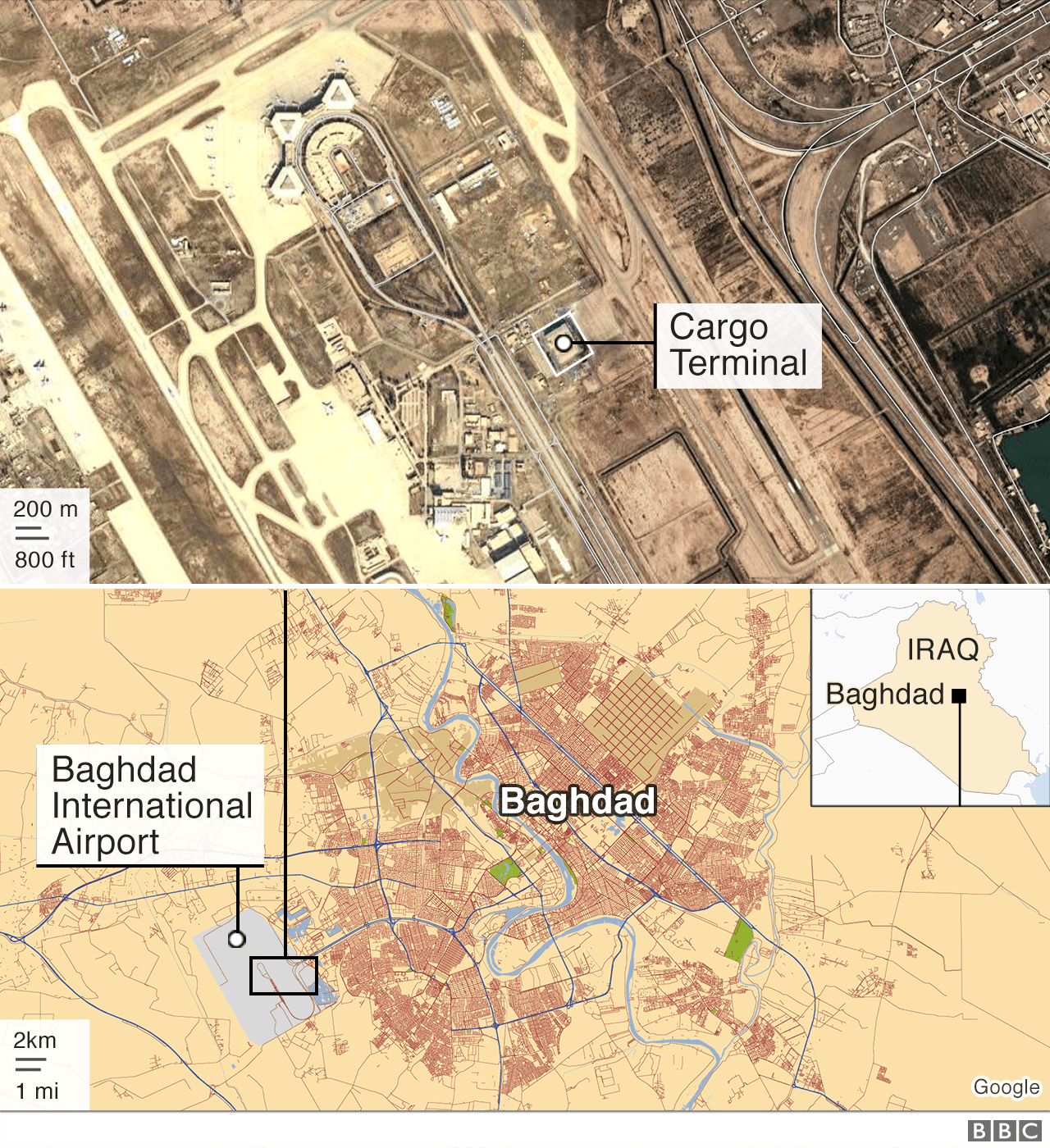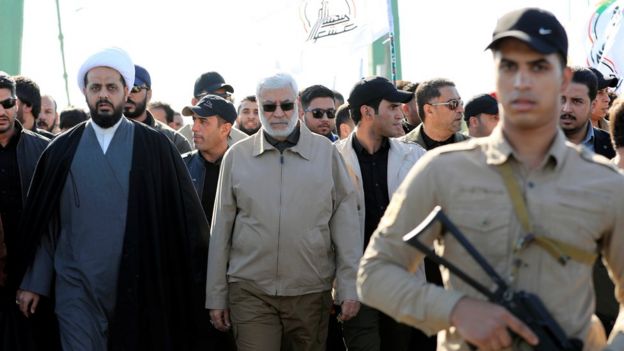
Iran's most powerful military commander, General Qasem Soleimani, has been killed by a US air strike in Iraq.
The 62-year old spearheaded Iranian military operations in the Middle East as head of Iran's elite Quds Force.
He was killed at Baghdad airport, along with other Iran-backed militia figures, early on Friday in a strike ordered by US President Donald Trump.
Soleimani's killing marks a major escalation in tensions between Washington and Tehran.
Under his leadership, Iran had bolstered Hezbollah in Lebanon and other pro-Iranian militant groups, expanded Iran's military presence in Iraq and Syria and orchestrated Syria's offensive against rebel groups in the country's long civil war.
Iran's Supreme Leader Ayatollah Ali Khamenei said "severe revenge awaits the criminals" behind the attack. He also announced three days of national mourning.
Soleimani was widely seen as the second most powerful figure in Iran, behind the Ayatollah Khamenei. His Quds Force, an elite unit of the Iranian Revolutionary Guards, reported directly to the ayatollah and he was hailed as a heroic national figure.
But the US has called the commander and the Quds Force terrorists and holds them responsible for the deaths of hundreds of US personnel.
President Trump, who was in Florida at the time of the strike, tweeted an image of the American flag shortly after the news broke.
A statement from the Pentagon - the headquarters of the US Department of Defense - said Soleimani had been "developing plans to attack American diplomats and service members in Iraq and throughout the region".
"This strike was aimed at deterring future Iranian attack plans," it added.
Meanwhile, global oil prices have soared by more than 4% in the wake of the attack.
Soleimani and officials from Iran-backed militias were leaving Baghdad airport in two cars when they were hit by a US drone strike near a cargo area.
The commander had reportedly flown in from Lebanon or Syria. Several missiles struck the convoy and at least seven people are believed to have died.

Iran's Revolutionary Guards said Iraqi militia leader Abu Mahdi al-Muhandis was among those killed.
Muhandis commanded the Iranian-backed Kataib Hezbollah group, which Washington blamed for a rocket attack which killed a US civilian contractor in northern Iraq last Friday.
He also effectively led the Popular Mobilisation units (PM), an umbrella of militias in Iraq dominated by groups aligned with Iran. Most of those killed in the strike belonged to the PM, the organisation said. Soleimani's son-in-law and a member of the Lebanese Hezbollah were also among the dead, it added.

Abu Mahdi al-Muhandis (centre) was also killed in Friday's strike
The Pentagon statement said: "At the direction of the president, the US military has taken decisive defensive action to protect US personnel abroad by killing Qasem Soleimani."
It added: "The United States will continue to take all necessary action to protect our people and our interests wherever they are around the world."
The drone strike comes days after protesters attacked the US embassy in Baghdad, clashing with US forces at the scene. The Pentagon said Soleimani approved the attacks on the embassy.
Iran's most powerful military figure was regarded as the strategic mastermind behind its vast ambition in the Middle East and the country's real foreign minister when it came to matters of war and peace.
As commander of elite special forces, he orchestrated covert operations, involving a web of proxy militias, across the region. He also commanded political influence inside Iran and was regarded as second only to Iran's all-powerful Supreme Leader.
He was widely considered a principal architect of President Bashar al-Assad's war in Syria, the ongoing conflict in Iraq, the fight against Islamic State, and many battles beyond.
The silver-haired general with a close-cropped beard was a cult hero for his fighters and the face of evil for his foes. For years, US officials considered killing a cunning adversary who ordered attacks on their forces and taunted them with social media barbs.
At times some of their aims were aligned, including in the fight against Islamic State, but they remained sworn enemies.
Iranian officials are categorical - this is an act of war to be met by "harsh retaliation". Iran has many ways and means to strike back as a long-simmering crisis suddenly moves to a new, dangerous chapter.
How has Iran responded?
Iran's Foreign Minister, Javad Zarif, called the attack an "act of international terrorism", tweeting that the US "bears responsibility for all consequences of its rogue adventurism."
Mohsen Rezaei, the former commander of the Revolutionary Guards, said Iran would take "vigorous revenge on America". A spokesman for the Iranian government said the country's top security body would meet in a few hours to discuss the "criminal act of attack".
"Iran and the other free nations of the region will take revenge for this gruesome crime from criminal America," President Hasan Rouhani said in a statement.
His death has "redoubled the determination of the nation of Iran and other free nations to stand against America's bullying", he added.
In other reaction:
In Washington, senior members of President Trump's Republican Party welcomed the news. Top House Republican Kevin McCarthy said the strike was a "display of resolve and strength".
But Democrats were critical. House Speaker Nancy Pelosi said the move risked "dangerous escalation" and suggested Congress should have been consulted.
From 1998, Qasem Soleimani led Iran's Quds Force which handles clandestine operations abroad.
Iran has acknowledged the role of the Quds Force in the conflicts in Syria, where it has advised forces loyal to President Bashar al-Assad and armed thousands of Shia Muslim militiamen fighting alongside them, and in Iraq, where it has backed a Shia-dominated paramilitary force that helped tackle IS.
These conflicts turned the once-reclusive Soleimani into a something of celebrity in Iran.
The Trump administration has alleged that the Quds Force is "Iran's primary mechanism for cultivating and supporting" US-designated terrorist groups across the Middle East - including Lebanon's Hezbollah movement and Palestinian Islamic Jihad - by providing funding, training, weapons and equipment.
US Secretary of State Mike Pompeo designated Iran's Revolutionary Guards and its Quds Force as foreign terrorist organisations in April.